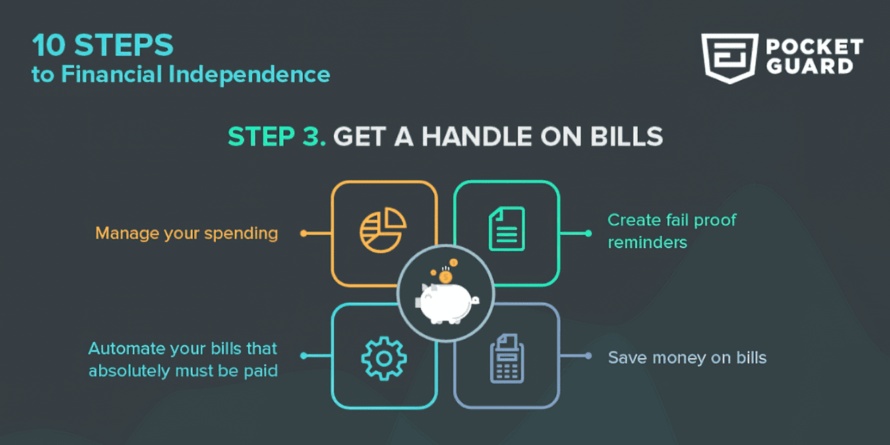Not sure how to keep your bills under control? No problem! We’ve rounded up a few time-tested tips to help you stay on top of bills, avoid fees and sleep well at night knowing that you are building a great financial foundation.
STEP 3: GET A HANDLE ON BILLS
Set yourself up for success
The two primary reasons bills get out of hand are the lack of organization and out-of-control spending. Once you develop a budget, it is a lot easier to manage your spending; so if you haven’t yet, take a step back and do it. You’ll thank yourself later. Once you have a budget in place, go through and confirm the dates your bills are due.
Create fail proof reminders
Most banks have bill pay. You can add all of your bills and due dates in bill pay settings. It doesn’t mean you will be automatically charged, but it does mean that you can manually pay bills via online banking and your bank will send the funds to the intended recipient. Alternatively, you can use a financial app to manage payments. If all else fails, enter a reminder for each bill in your electronic calendar. The goal is to get bill payment notifications monthly before each bill is due.
Automate your bills
Unless you make a lot of money, it’s not always practical to set up automatic bill payments. Let’s be honest, things happen and sometimes these automatic payments wreak havoc in our checking accounts. Multiple insufficient funds fees can be a lot more costly than a single late fee, so sometimes, it’s better to absorb the latter.
A good rule of thumb is to automate bills that absolutely must be paid, like auto insurance and student loans, as well as bills that offer discounts for automatic payments (many cell phone carriers, insurance companies and student loan servicers now offer this option).
Save money on bills
There are quite a few ways you can reduce the overall amount of money you dish out on your bills.
- Cancel services you don’t use, like automatic subscriptions to magazines, sports clubs memberships, Netflix or any other service that you haven’t used in the last month.
- Always pay on time. Most credit card late fees now top $20. Quite a few are as high as $40. If you let your bills get behind, you can easily lose hundreds of dollars annually (something you can spend on Christmas gifts or vacation).
- Autopay. As we mentioned earlier, autopay can sometimes reduce your monthly bill. Visit each individual payee’s website to figure out which companies offer autopay discounts. Some discounts can be as high as 10–15%!
- Pay bills off faster. You’ve probably heard that if you pay your mortgage or auto loan biweekly, you’ll be making an equivalent of an extra payment each year, helping you save quite a bit on interest and allowing you to eliminate the corresponding debt significantly faster than you would have otherwise. Inquire if you can make additional principal payments on top of that.
- Install energy efficient light bulbs, a smart thermostat and z-wave light switches. You can control these with your cell phone via an app as well as set up rules for when to turn things off and when to adjust the temperature automatically. These changes can result in hundreds of dollars in energy savings.
Once you’ve created a budget, it’s easy to get a perspective on your bills and spending. Doing a bit of legwork to properly set up your bill payments can help you save more money that you have imagined. Money that you can use to pay off debt, travel, or start a business.
Aug 03, 2017
Aug 03, 2017



